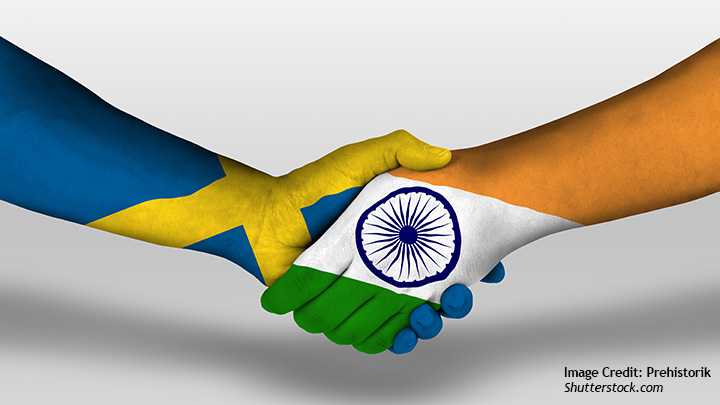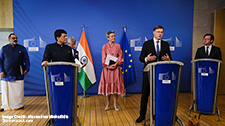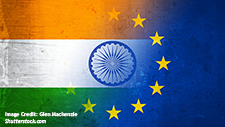India-Sweden Strategic Compass, March-April 2024 • Vol.3 • No.2

Ana Carolina De Oliveira Assis, Giorgia Piovesan and Jagannath Panda
In an election year, as is true for both in India (Lok Sabha) and in the EU (European Parliament), it is difficult to focus on objectives beyond the present for all countries
involved. However, to not dilute the hard work of recent years, it is extremely important for India, the EU, and the Nordic-Baltic countries, particularly Sweden, to sustain the pace of the ongoing upward trajectory. In January this year, the European Parliament, too, commended the growth in the momentum of the EU-India strategic partnership in recent years, “reflecting the strong political, economic, social and cultural ties and a renewed political will to strengthen their partnership across a number of sectors and policy areas.” It has rightly noted that the ties have not yet reached their full potential.
Nonetheless, no partnership is perfect, and there is always room for growth. The historic signing of the India-EFTA TEPA; the EU-India startup collaboration (developing battery recycling technologies for EVs); ongoing negotiations for the EU-India FTA; and the adoption of new Schengen visa rules under the “new cascade regime” highlight the latest constructive engagements in India-Europe ties. India’s trade with the Nordic-Baltic states has been on the rise, too. Moreover, as the China threat becomes bigger and stronger and as India gains in strengths, the strategic ties with India will assume greater resonance for Europe as a whole, not just Sweden. This is primarily because the Indo-Pacific – on which Europe is dependent for its trade, investments, and economic opportunities – is at the center of the world’s economic and political imperatives, India is one of the main drivers of that growth. Moreover, India is seen as a conduit between the East and the West; it is increasingly recognized as a leading voice of the Global South; and it is the world’s biggest democracy and most populous country, which is also set to become the third-largest economy with a burgeoning talent force in the near future. Naturally, the same is true for India-Sweden ties, which are gaining newer grounds of convergence, from space tech to defense and cybersecurity. The months after the parliamentary elections both in Europe and India will surely reveal a clearer picture.
Related Publications
-
Trade, Connectivity and Supply Chains in EU-India Relations
In the decade and a half since 2007 when the EU and India first started their FTA negotiations, the world economic order has undergone a sea change. During that period, […]
-
ISDP Annual Report 2023
ISDP’s Annual Report for the year 2023. We look back on 2023, a year in which tensions and conflicts captured the strategic space in ISDP’s focus areas, making headlines around […]
-
India-Middle East-Europe Economic Corridor: Will It Get Subsumed by Its Grand Vision?
The recently concluded Group of Twenty (G20) Summit in New Delhi under India’s presidency was, undoubtedly, a crowning moment for India. From providing the G20 with new relevance among the […]
-
Navigating the Indo-Pacific: How Australia and the EU Can Partner for Peace, Stability, and Prosperity
To navigate the choppy waters of the Indo-Pacific, the EU and Australia must be on the same wavelength regarding shared interests in rules, values, and an open and liberal economic […]
-
Indian Prime Minister Visits Poland: Dr Aleksander Olech interviews Dr. Jagannath Panda
Narendra Modi, the Prime Minister of India, is visiting Poland today, marking the first visit by an Indian Prime Minister since 1979. The key topics of discussion will include the […]




